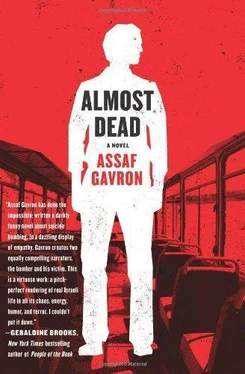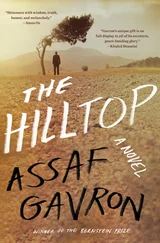Maybe I should have said something to my brother, who hated even a Jewish sweet. Maybe if I’d stood up to my big brother and said something I could have knocked a little sense into his proud head.
I visited the support group every Wednesday for the next thirteen weeks. At 7.30 every Wednesday I would go to the room on the fourth floor of the Hadassah Ein-Kerem Hospital, four floors below where Shuli lay in a coma.
Wednesday became the day that held me together. The other days of the week were like a rollercoaster that had skipped the rails, with no direction or control; time distended like stretched gum. Some days sank slowly into a swamp of zombified routine, brushing teeth, sitting in front of the computer, Channel 2, takeaways, arguments with Duchi (‘Who the hell is this Shuli you were talking about on Rafi Reshef?’) and wondering where the time had gone…The rest of the time, frankly, I was just a confused insomnia-dazed mess. Wednesdays were my bulwark against it all, something solid and stable at the week’s midpoint. Wednesdays were a point of orientation, a reminder that something had changed, a focus for the rest of the week. They stopped me escaping to the past of Before, stopped my attempts to block out the present of After. They took me back to Jerusalem and nailed me to the cross of reality. They stilled time.
Every Wednesday at 2 p.m. I would drop everything else and take a Little No. 5 to Tel Aviv’s central station. From there, a No. 405 to the central station in Jerusalem and then a No. 27 to Hadassah Ein-Kerem. It was Ilan the group leader’s suggestion — Duchi wanted me to take the Polo — and I was happy to give it a shot. But the first time I set foot on the minibus I threw up. People were very nice about it: some of them recognised me as the Croc. I threw up again. Duchi argued for the Polo again. But Ilan convinced her, and she convinced me, and after that first time I didn’t throw up. More than that. As the nausea subsided, I began to enjoy it.
My days at the hospital began with a Twix from the machine on the ground level and a visit to Shuli. Then a check-up with the doctor, who measured the gradual reduction of the bump on my forehead, told bad jokes—‘I gotta take your head for a test, can you manage without it for a couple of hours?’—and gave me my medication. After the group had finished, around 9.30, I’d take the No. 27 back to the station, have an egg sandwich in the Café Europa there (Ilan’s idea — to have what I’d had on the day of the bombing) or some falafel (my idea) and then No. 480 to the Tel Aviv North train station, where Duchi would be waiting to pick me up because, as she put it, ‘Enough is enough!’
Ilan was losing his hair and wore it long at the back. Not quite long enough for a ponytail, thank God, just a balding man’s compensatory mullet. He also had a goatee, and was rather short and chubby. There was no denying the fact that Ilan was extremely ugly, and I’m not just saying that because of what happened later. His impressive blue eyes stood out, but only in the way the Taj Mahal stands out from the squalor and cow shit of Agra.
Maybe the Taj Mahal’s on my mind because of Naama, the prettiest girl in the group, who’d been to India a number of times. I found it hard to take my eyes off her at the first meeting. Fortunately she talked a lot — she talked all the time — and it got on my nerves after a while, but at first I just wanted her to keep talking, so I could keep looking at her. She’d been in an attack in Jerusalem five years earlier. Her two best friends had been killed right next to her. Since then she hadn’t travelled on buses, didn’t sit in cafés or restaurants and kept away from the city centre. When she walked down the street she avoided bus stops and other places which she’d marked down on a map. Every time there was an attack in Jerusalem she added its location to her map. She had a theory she repeated every week, which explained in almost credible scientific detail why it was her destiny to die in an attack. She’d become accustomed to living with the fear. Her radar was permanently on: every five minutes she was compulsively checking out what was behind her.
‘But where’s the logic?’ I asked her in my first meeting. ‘They never bomb the same place twice. They know the security will be tighter and so on.’ It reminded me of the argument with Duchi the day after the Little No. 5 attack. But Naama wasn’t Duchi and didn’t yell back, only dropped her charming long lashes over her eyes and hung her head. ‘Let’s listen to our friends’ stories, Croc, and not interrupt,’ Ilan said. ‘You should recognise that logic is not always what determines our lives. There are other forces in action.’ I swallowed, pulled my head back into my shell and apologised.
‘They bombed the No. 18 twice in two weeks,’ said Naama.
‘You’ve got a point,’ I said.
Uzi Bracha was a welder who was called out to fix a broken traffic light one morning. He went up on the cherry picker to weld the pole. He hadn’t been told that it had been broken in an attack. Or that there would be pieces of skin and what he was sure was an eye still on it. Uzi Bracha went home that day and called a locksmith who installed eight locks on his door. After that he went to a gun shop on the Jaffa Road and bought a pistol. He came home and sat with his pistol cocked on the armrest of his chair opposite a door that was locked eight times over. I liked Uzi. He didn’t speak much and looked genuinely frightened: I liked the sincerity of his fear.
I told them about Giora Guetta, Humi and Shuli, still lying in a coma above our heads. I described the shattered rear window, the boot hitting my head. I said, ‘I don’t think I’m a shock victim.’ They asked me, ‘Do you check over your shoulder sometimes?’ Sometimes. ‘Does your heart suddenly accelerate?’ Nought to sixty in five seconds. ‘Do you get nauseous?’ All the time. ‘Does the sound of an ambulance make you break out in a cold sweat?’ So that’s what a cold sweat is. ‘Do you cry?’ No, but my eyes can suddenly fill with tears. ‘The theme tune to the news?’ Yeah, that’ll do it. ‘Classic shock victim,’ Uzi concluded. ‘Allow me to make the diagnoses, eh, Uzi?’ said Ilan. ‘Look, Croc, the danger of damage to the body is signalled by the body’s own alarm system — fear. Fear is a crucial biological defence mechanism. It’s healthy.’
Yulia cried constantly. At first I hated it but after a few meetings it became a background hum. She’d been in Café Europa. My sister-in-arms! Yulia remembered all the faces, including mine and Shuli’s. She’d been brought to the emergency room in what Ilan called a dissociative state and suffering from severe sleep problems. Daniela, or Dani as she insisted we call her, was with her sister and her sister’s two-year-old daughter at a wedding in Bet-Shemesh. Her sister and niece were both killed. Dani was severely injured but managed to drag herself out of the rubble. She was in hospital for three months, and it took her much longer than that to learn to walk again. But her physical condition didn’t interest her. Dani couldn’t stop trying to reconstruct what had happened to her sister and niece. Where exactly had they been when the bomber blew himself up? How exactly were they killed? The explosion itself or the collapsing building? She was tormented by guilt about surviving. Did she limp past her sister and the baby, ignoring their moans of pain? ‘A little child, always talking, babbling away…’ ‘The worst thing,’ pretty Naama added, ‘is that a child doesn’t know, can’t understand. That’s what’s so unnatural. I mean, an adult knows the risks, knows there are terrorist attacks, that there’s the possibility he’ll be next, but what did she know? Though at least she went with her mother and not alone — I mean, imagine if…’ She liked to talk, Naama. And there was the guy who’d had seventeen different operations; the girl who’d stopped eating; the guy with a huge burn on his forehead and hearing in only one ear; and an older woman who arrived every week with a different son, daughter, granddaughter or grandson and who never, we noticed, ran so low on relatives that she ever had to bring the same one twice.
Читать дальше












